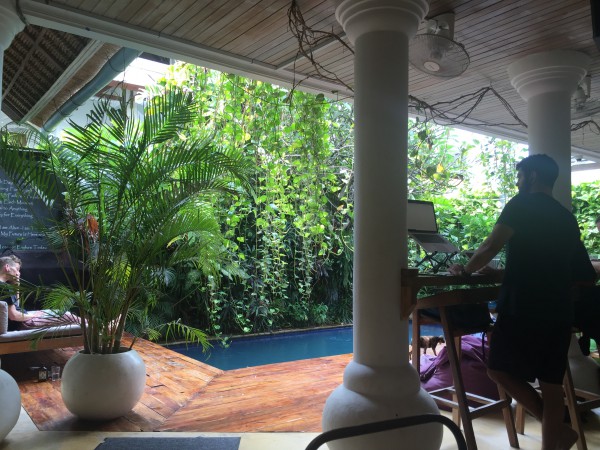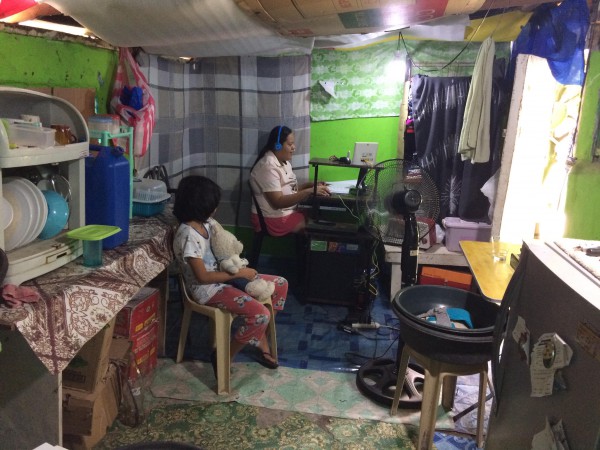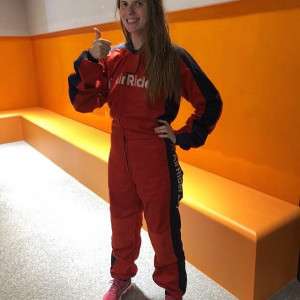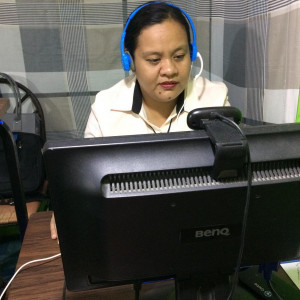Do you have a dedicated space to work?
Interview with Hannah, a freelance writer that travels the world
My physical workspace changes depending on where I am. Last year, I had an office in my home with a desk. When I was abroad earlier this year, I worked at an amazing coworking space. Right now as I’m visiting friends and family, I mostly work at dining room tables. If there is a surface that fits my laptop, I’ll make it work.

Hannah is a freelancer writer and social media manager that travels the world while working remotely. Read her interview to learn how she works.
Read full interview from Interview with Hannah, a freelance writer that travels the world.
Interview with Bennah, a remote ESL teacher that teaches kids English all over the world
My workspace is in our kitchen; I bought a computer table and set it up on the part of the kitchen. I did this since it was the only space I have in my apartment.
I also bought an emergency LED bulb in case of electricity shortage which is very common in my place. I also have a laptop and a pocket wifi set up in case this happens.

Bennah is an ESL (English as a Second Language) Teacher who teaches students from all around the world while working from home.
Read full interview from Interview with Bennah, a remote ESL teacher that teaches kids English all over the world.
Interview with Deb, a sales copywriter who transitioned from software development
Yes, I do, a study desk on one side of my bedroom currently. I do have plans to rent a separate workspace sometime in the medium-term future. The reason is that at times, my bed proves to be too alluring and I find myself taking naps which can be counter-productive at times.
Deb made the jump from full-time software developer to freelance sales copywriter—learn how he made the transition.
Read full interview from Interview with Deb, a sales copywriter who transitioned from software development.
Interview with Henry, a consultant who found remote work by saying No
My wife and I both work from home, so we have a dedicated home office we share. We have two desks (we each invested in those before we had kids), but only one chair.
We gave away our second office chair when we realized we wouldn't be working at the same time until our kids were much older.
Sometimes a "no" can lead to an exceptional opportunity. For Henry, that answer led to an ideal remote work career. In this interview, Henry shares his remote work tool stack, and essential tip for remote employees and managers.
Read full interview from Interview with Henry, a consultant who found remote work by saying No.
Interview with Hanling, a data scientist that works remotely on machine learning
No, I can work as long as there's computer and network. Usually I work in the laboratory, library or my dormitory. I even worked in the airport when waiting my friends.
Hanling started working remotely as a student and now does freelance machine learning and data analysis for clients all around the world.
Read full interview from Interview with Hanling, a data scientist that works remotely on machine learning.
Interview with Erin, a virtual assistant with a successful approach to freelancing
Since we travel so much, I do not have a dedicated work space. Having said that, I try to ensure that our AirBnB rentals at least have a kitchen table that I can work from. I avoid working from my bed since I try to mentally keep that space reserved for rest and relaxation.
Erin has found freelancing success as a virtual assistant—see her organizational tips & insights into how she picks clients that suit her business.
Read full interview from Interview with Erin, a virtual assistant with a successful approach to freelancing.
Interview with John, a web developer who works from home
One of the major selling points for working remotely is the fact that you can 'work from wherever you want'. And yet, I'd say that 90% of my time is spent sitting or standing at my desk in my home office.
Occasionally, I will move downstairs to work from the couch for a bit, or if the weather is reasonable, I'll sit outside. But that's typically only when I'm working on writing projects, such as blogging or answering emails.
When it's time to do any sort of development or research work, I prefer to be at my desk with a big external monitor.
For about 6 months, I had a dedicated desk at a coworking facility. I was able to set up an external monitor and I'd bring my keyboard with me each day. So the setup was similar to working from home and I really enjoyed it.
There were two key problems that caused me to stop using that as my office 5 days a week:
- My budget for food and gas shot through the roof. Eating out 5 days a week in downtown was crazy expensive.
- Even though it was only a 15-20 minute drive, I felt like I was losing about 2 hours of productivity each day. By the time I had reached the office, got the desk set up, and had all the mini-conversations that happen all the time at coworking spaces, my actual work time was diminished.
These days, I have 2-3 calls with clients or team members each day. Working at a coffee shop or coworking facility just doesn't seem like a reasonable option anymore.
John is a web developer running a mini-agency inside a larger WordPress agency - learn how calendar management and establishing boundaries have helped him boost his productivity.
Read full interview from Interview with John, a web developer who works from home.
Interview with Haley, a VP of Operations shares her stellar remote work strategies
I am dedicated to my bedroom. It makes naps easier. 😅
Currently, I either work at my desk in my room or at my kitchen table. I live in a quiet condo on a quiet street, and find that hours easily pass without remembering that I’m working.
Haley has figured out the way she works best as a VP of Operations. See her principles of remote work and the unique advice a former boss gave her about breaks.
Read full interview from Interview with Haley, a VP of Operations shares her stellar remote work strategies.
Interview with Jake, a customer success manager for Atlassian
Yes, this is a must-have for me. I have a dedicated office, and that's all I ever use it for. I need to be able to shut off work, and I find that's a really effective way of doing it.
Prior to being a full-time remote worker, I would work from home occasionally, but my days were never really that productive. I was easily distracted.
But now that I have a dedicated workspace for doing work, and all of the tools and things in place to be productive, it's been a really easy transition for me.
Jake was burned out on the San Francisco lifestyle—see how he transitioned from working in-office to working remotely for a remote-friendly company.
Read full interview from Interview with Jake, a customer success manager for Atlassian.
Interview with Ascencia, a content marketer, and avid gig economy professional
Not really. I get bored easily, so I usually just keep moving inside the house. I can work in the living room, my room, or my parents’ room. If I get stuck in a rut, I will bring my work (read: my laptop) to nearby cafes.
I realized I should have a proper, ergonomic work setup, though.
A forgotten two-year-old Upwork account allowed Ascencia to become a content marketer—see how the gig economy has offered her an alternative path to success.
Read full interview from Interview with Ascencia, a content marketer, and avid gig economy professional.








